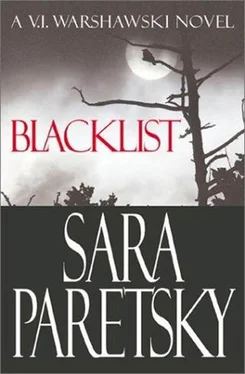Catherine didn’t say anything on the ride home, but the next afternoon when I got in from work, she tried to sort out her complicated feelings. “I loved Granny. I thought she and Grample were the most wonderful people on earth. I thought of them the way Harriet thinks of her brother. So how could they give Kylie Ballantine’s name to that creep Olin and then set themselves up as the biggest free speech defenders in the universe?” She was sitting on my living room floor with her good arm around Peppy.
I shifted in my chair: these same questions had been churning in my own mind. “Everyone has a different breaking point. And a different fear point. The things you can’t bear to face, I mean. The McCarthy and HUAC blacklists shattered lives. People never worked again, or never worked well. They were ostracized, they lived in terrible poverty. Some committed suicide. Many went to prison, only for their beliefs, not for anything they’d done-not in China or Iraq, but right here in America.
“You don’t race to embrace that kind of martyrdom. At the same time, your grandfather feared for the future of Bayard Publishing. Geraldine Graham’s mother was constantly threatening to give her shares in the company to Olin Taverner. If Laura Drummond had known your grandfather supported a group that she thought was a Communist front, she’d certainly
have given Olin her shares. And that would have turned Bayard into a rightwing organization. They wouldn’t publish the great magazines they do today, such as Margent, or writers like Armand Pelletier and the guy you worked with last summer, Haile Talbot.”
“So you think Grample was right to betray Kylie Ballantine and Pelletier and-whoever else he did betray? To save the press?” Her eyes blazed. “No. I don’t think it was right. I don’t believe that considering the greater good-the integrity of Bayard Publishing, in this case justifies betraying friends.”
“And now, with his mind gone, I can never ask him what he was thinking, why he did it!” she cried. “I can’t stand any of this. Seeing him sick when I loved him so much-I used to feel so smug, knowing Granny and Grample were my family, compared to the kind of people my friends have, the kind who only think about money all the time! And now-my family is thinking, maybe not about money, but they don’t think about people and how to live a principled life, like they always claimed they did.”
“You and I are judging this in the calm and safety of my living room,” I said. “We’re not facing a congressional inquiry that would use our beliefs to turn us into criminals. If that ever happens to us, then we’ll know what we’re made of. I spent a month in prison once. It was a terrible experience, one that very nearly destroyed me. If I knew I had to go to prison again, I don’t know how strong I would be in standing up for my values. I hope strong to the end, but even more, I hope I never have to find out. I’m only trying to say that what your grandfather did makes me-oh, incredibly sad, heartbroken, really. But I can’t judge him, because I haven’t been on that battlefield, looking into the mouths of those cannons. But your grandmother crossed a different river when she resorted to murder. And I want to see her pay the price she earned by killing Marcus Whitby. Which is why you should move out, instead of staying here to watch me do it.”
“But how can I ever live with them again?”
“You could go to Washington with your father,” I suggested. “Yeah. You know he calls me every hour on the hour.”
It wasn’t quite that often, but he did call from Washington once or twice a day, alternatively cajoling and ordering Catherine to follow him east.
“Daddy can’t believe I’m not ready to embrace the right. He thinks seeing that Grample was a fraud means I should abandon all his and Granny’s ideals. Daddy’s fed up with me trying to defend them.”
“So I gathered. You can’t stay here forever, you know. After a while, the romance of living on a trundle bed would pall; you’d start wanting your private bath, your wide-screen television and all the other simple pleasures of home. Anyway, aside from your grandmother, you need to be in school.”
“Back to Vina Fields, with everyone staring at me and talking about me?” I grinned. “A chance to show what you’re made of But you’re a rich girl, and a smart one: you have choices. You can go to Washington, but insist on a school with more progressive values than the one your father picked out. You could go to boarding school-doesn’t your family have a tradition with Exeter? But you only have one more year after this one; transferring for your senior year might not be in your best interest. Isn’t there a friend you could stay with?”
She muffled her face in Peppy’s fur. “I’ve been through too much this winter. None of my friends is close enough to understand. And anyway, school seems totally pointless. Lacrosse, who’s dating who, it’s like-after seeing Benji die, none of it means anything.”
“You could take a year off to work with Habitat for Humanity or a similar group that tries to help people as poor as Benji’s mother. My lover-if Morrell-when Morrell comes home, he can help you find a good program.”
That suggestion appealed to her at once. We spent the next several days discussing hows and whens. Catherine finally decided to finish out her year at Vina Fields, since she couldn’t do much until her arm recovered, then try to start in a program like Habitat during the summer.
I hadn’t heard from Darraugh since the night I’d abandoned him in his bedroom, but he surprised me again after Catherine had decided to go back to school: he called to offer her a home for the balance of the school year. To my relief, Catherine accepted: I was more than ready for someone else to have care of an ardent adolescent.
She decided to spend a weekend in New Solway with her grandfather. She would collect her things and move in with Darraugh on Monday
morning. She talked to Renee, making her promise to stay in town, and on the last weekend in March, when daylight savings time began, climbed with me into the Mustang for the drive west.
I brought the dogs with me. After I’d seen Catherine into the Bayard mansion, where Ruth Lantner refused to say a word to me, I drove over to Larchmont and let the dogs out. I took Mitch and Peppy with me through the woods, retracing the route that Catherine followed as she slipped home after bringing Benji supplies. The dogs loved it: they found deer and chased them through the woods.
I wasn’t really thinking about Catherine and Benji as I walked back to Larchmont, but about Calvin Bayard and all the nights he walked this path to lie with Geraldine. To lie with Geraldine, to lie to her.
The Boy Wonder, had he been a golden calf, an idol too false for worship? Or just a flawed human being? Calvin shone, that was his problem. When I heard him speak all those years ago, he seemed literally to shine like gold itself. I was dazzled to the point of enchantment. If you had that gift, the gift of enchanting those around you, what would ever make you want to temper it?
The dogs caught up with me as I passed the Larchmont outbuildings. Mitch dove into the pool and pulled out one of the rotting carp. He rolled in it before I could grab him. I got Peppy into the car before she could join him, then went back to leash him up. “One thing’s certain in this life, my friend,” I told him. “You need a whole lot more dazzle than you’ve got to make me overlook that stench.”
When I’d shoved him into the back of the Mustang, I drove the short distance around Coverdale Lane to Anodyne Park. Geraldine Graham was home, the guard at the gate told me; I could go right up.
Geraldine answered the door herself, as she had when I first came to visit her. Her left foot was still in a cast, she was using a walker, but she was managing on her own. She did ask me to get down her Coalport mugs for tea, but she handled the boiling water and the tea bags without my assistance.
Читать дальше












